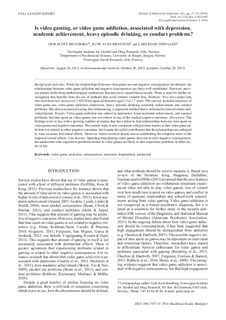Is video gaming, or video game addiction, associated with depression, academic achievement, heavy episodic drinking, or conduct problems?
Journal article
Permanent lenke
http://hdl.handle.net/11250/281094Utgivelsesdato
2014Metadata
Vis full innførselSamlinger
Sammendrag
While the relationships between videogame use and negative consequences are debated, the relationships between videogame addiction and negative consequences are fairly well established. However, previous studies suffer from methodological weaknesses that may have caused biased results. There is need for further investigation that benefits from the use of methods that avoid omitted variable bias.
Two wave panel data was used from two surveys of 1,928 Norwegian adolescents aged 13 to 17 years. The surveys included measures of videogame use, videogame addiction, depression, heavy episodic drinking, academic achievement, and conduct problems. The data was analyzed using first-differencing, a regression method that is unbiased by time invariant individual factors.
Videogame addiction was related to depression, lower academic achievement, and conduct problems, but time spent on videogames was not related to any of the studied negative outcomes.
The findings were in line with a growing number of studies that have failed to find relationships between time spent on videogames and negative outcomes. The current study is also consistent with previous studies in that videogame addiction was related to other negative outcomes, but it made the added contribution that the relationships are unbiased by time invariant individual effects. However, future research should aim at establishing the temporal order of the supposed causal effects.
Spending time playing videogames does not involve negative consequences, but adolescents who experience problems related to video games are likely to also experience problems in other facets of life. Studiens hovedkonklusjon er at det er en svært svak sammenheng mellom hvor mye tid tenåringer bruker på dataspill og negative konsekvenser som depresjon, dårligere skoleprestasjoner og atferdsproblemer.
Geir Scott Brunborg har sammen med Rune Aune Mentzoni (UiB) og Lars Roar Frøyland (NOVA) undersøkt dataspill-vaner hos 2000 norske tenåringer. Gjennom to spørreundersøkelser kartla forskerne tid brukt på spill, spilleproblemer, depresjoner, skoleprestasjoner og atferdsproblemer.
En økning i tid brukt på dataspill ga altså ikke negative konsekvenser. Det gjorde derimot en økning i symptomer på spilleavhengighet.
Studien fant at jo flere symptomer på spillavhengighet ungdommene utviklet i løpet av toårsperioden, dess mer utsatt ble de for andre typer problemer som depresjon, dårlige skoleprestasjoner og atferdsproblemer, forteller forskeren.
Eksempler på symptomer på spilleavhengighet er at ungdommene opplever at de mister kontroll over dataspillingen, at det oppstår konflikter i relasjon til foreldre, skole og fritidsaktiviteter, og at de blir irritable når de ikke får spille.
Studien baserer seg på to spørreundersøkelser av 2000 norske tenåringer i alderen 13 - 17 år, gjennomført av Norsk institutt for forskning om oppvekst, velferd og aldring (NOVA). Undersøkelsene ble utført i 2010 og 2012.
Beskrivelse
-
